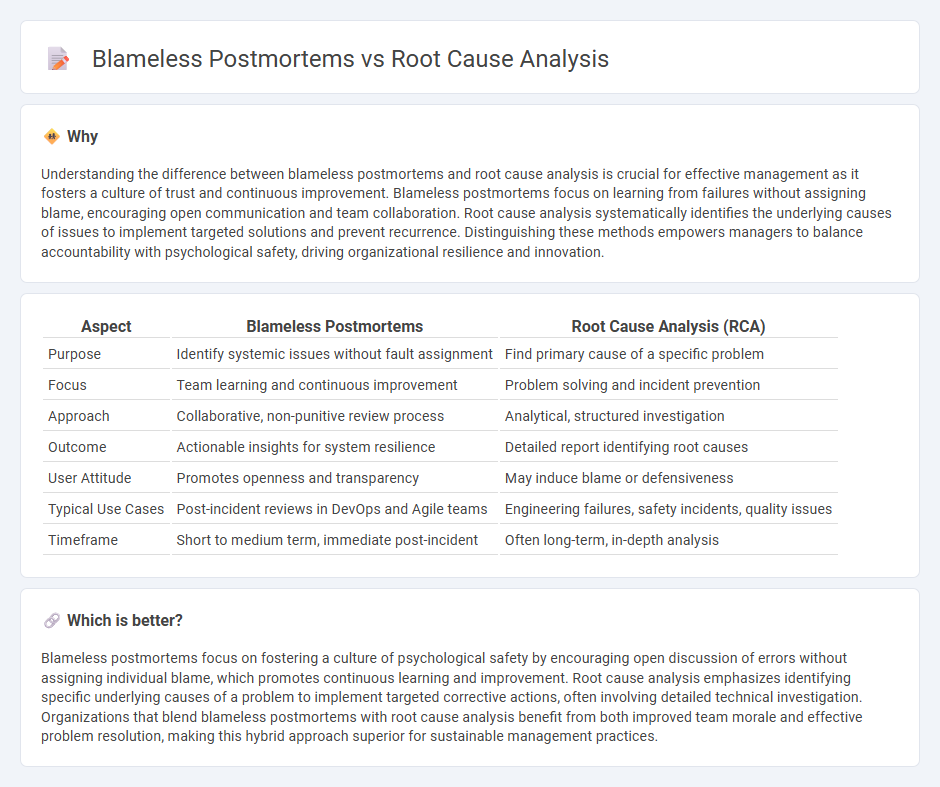
Blameless postmortems focus on understanding system failures without assigning personal fault, promoting a culture of continuous learning and improvement. Root cause analysis seeks to identify the primary cause of a problem to prevent recurrence, often emphasizing detailed technical investigation. Explore the benefits and differences between these approaches to enhance effective management practices.
Why it is important
Understanding the difference between blameless postmortems and root cause analysis is crucial for effective management as it fosters a culture of trust and continuous improvement. Blameless postmortems focus on learning from failures without assigning blame, encouraging open communication and team collaboration. Root cause analysis systematically identifies the underlying causes of issues to implement targeted solutions and prevent recurrence. Distinguishing these methods empowers managers to balance accountability with psychological safety, driving organizational resilience and innovation.
Comparison Table
| Aspect | Blameless Postmortems | Root Cause Analysis (RCA) |
|---|---|---|
| Purpose | Identify systemic issues without fault assignment | Find primary cause of a specific problem |
| Focus | Team learning and continuous improvement | Problem solving and incident prevention |
| Approach | Collaborative, non-punitive review process | Analytical, structured investigation |
| Outcome | Actionable insights for system resilience | Detailed report identifying root causes |
| User Attitude | Promotes openness and transparency | May induce blame or defensiveness |
| Typical Use Cases | Post-incident reviews in DevOps and Agile teams | Engineering failures, safety incidents, quality issues |
| Timeframe | Short to medium term, immediate post-incident | Often long-term, in-depth analysis |
Which is better?
Blameless postmortems focus on fostering a culture of psychological safety by encouraging open discussion of errors without assigning individual blame, which promotes continuous learning and improvement. Root cause analysis emphasizes identifying specific underlying causes of a problem to implement targeted corrective actions, often involving detailed technical investigation. Organizations that blend blameless postmortems with root cause analysis benefit from both improved team morale and effective problem resolution, making this hybrid approach superior for sustainable management practices.
Connection
Blameless postmortems and root cause analysis are interconnected by fostering an environment focused on understanding systemic issues rather than individual faults, which leads to more accurate identification of underlying problems. This collaborative approach enhances organizational learning and continuous improvement by encouraging open communication and psychological safety. Implementing these practices in management reduces recurrence of errors and drives effective problem-solving strategies.
Key Terms
Continuous Improvement
Root cause analysis delves deeply into identifying the specific origins of a problem to prevent recurrence, often emphasizing accountability for errors. Blameless postmortems prioritize a culture of psychological safety, encouraging open sharing without fear of punishment to foster learning and continuous improvement. Explore how integrating both approaches can optimize team growth and operational resilience.
Psychological Safety
Root cause analysis aims to identify the primary cause of a problem by systematically examining contributing factors, often emphasizing accountability, which can sometimes hinder open communication. Blameless postmortems prioritize psychological safety by fostering a culture of trust and learning, encouraging team members to share insights without fear of punishment. Explore how integrating psychological safety enhances organizational resilience and continuous improvement.
Source and External Links
How to Do Root Cause Analysis - This page provides a comprehensive guide on conducting root cause analysis, outlining key steps and methodologies for identifying underlying problems.
Root Cause Analysis Explained - This article defines root cause analysis and discusses its core principles, offering insights into its application for solving problems by addressing their underlying causes.
What is Root Cause Analysis - This resource provides an overview of root cause analysis, detailing various methodologies and techniques used to identify causal factors of problems.
 dowidth.com
dowidth.com